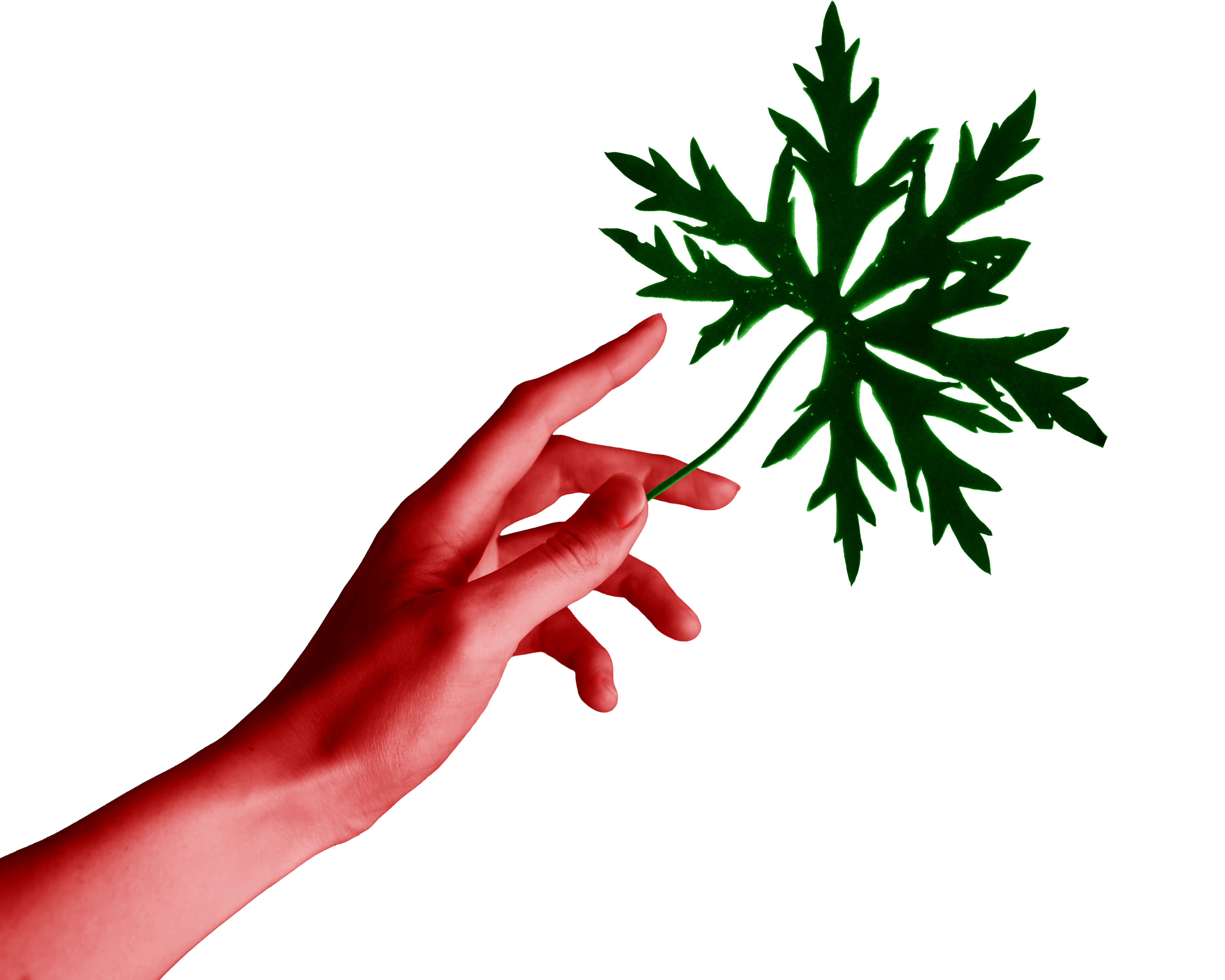
01.09.25

In 1913 Dundee artist Ethel Moorhead smashed the windows of a police station and threw pepper in an officer’s face as protest for the right to vote. The year before, she broke the window of a car thought to hold the Chancellor of the Exchequer. She was imprisoned multiple times, including for arson and assault, for her actions in pursuit of women’s suffrage.
History is often distorted by politicians, institutions and the media: activists and social movements are praised in retrospect, despite being demonised and persecuted at the time. And we continue to see this cycle today, where opposing genocide can see you arrested and labelled a terrorist — but inciting fascist violence will not.
In 1969 the American TV show, Black Journal, aired an interview with Nina Simone. In the segment she speaks about empowering Black communities and the duty of artists. “We will shape and mould this country or it will not be moulded and shaped at all anymore,” she says. “So I don’t think you have a choice. How can you be an artist and not reflect the times? That, to me, is the definition of an artist.”
In 2024 I attended the event, In Conversation with Leena Nammari, organised by Art Workers for Palestine Dundee at Generator Projects. Nammari, a Palestinian artist living in Scotland, discussed her series ‘Stop — Enough — We Are Tired — Khalas — Bikaffi — Ta’ibna’, which comprises posters of Arabic words and their English translations. She spoke about linguistic resonance and the context of these words in Palestinian culture and history, particularly in respect of the Israeli occupation and ongoing genocide.
Commenting on her exhibition for Sharing Not Hoarding, Nammari urges us to recognise our common humanity, “We all have an obligation to engage and bear witness to the world we inhabit, to what we see and what we hear,” she says. “Simply, and with words, sometimes, that could be enough.”
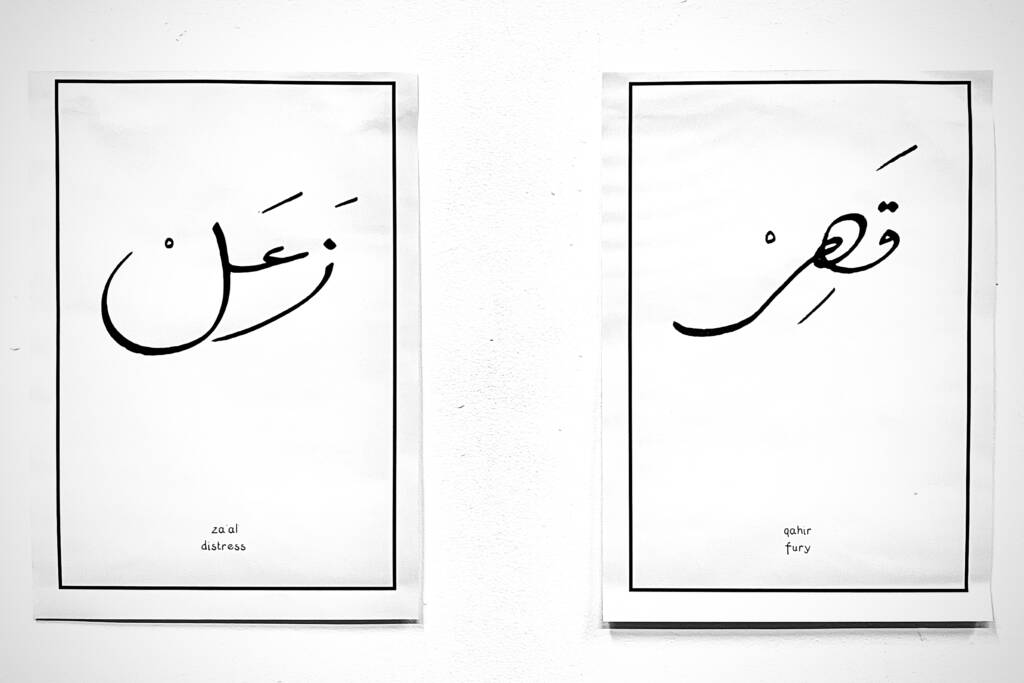
Posters by Leena Nammari, image credit Aileen Angsutorn Lees
As humans, our experiences, beliefs, emotions and actions shape how we move through the world (and vice versa). Impartiality does not exist. So, who has the privilege to be apolitical? Who benefits from staying silent? An artist that does not question, resist or advocate is not an artist — they are a brand.
In his 1963 lecture James Baldwin stated that what an artist creates says more about themselves than anything else. “Your responsibility as an artist… is to close the gap between what you see and what there is.”
Dundee has a rich history of activism, resistance and cross-community solidarity. In 1980, it was the first city in the UK to twin with a Palestinian city. In 2021, Dundee became the first Scottish city to recognise the state of Palestine. In 2023, artists and workers across the city’s cultural sectors came together to form Art Workers for Palestine Dundee as a local branch of the pre-existing group, Artworkers for Palestine Scotland. Nearly two years since their formation following the latest genocide, I caught up with the collective to talk about their experiences of resistance and change.
Art Workers for Palestine Dundee campaigns on and works with organisations in Dundee and the surrounding area to act ethically. It also organises community events, workshops and spaces to hold “more radical conversations than our institutions are capable of”.
Their advocacy work includes spreading awareness of and commitment to PACBI, the Palestinian Campaign for the Academic and Cultural Boycott of Israel. “We’ve had lots of grassroot support for us and for PACBI, within and outwith the arts,” the collective tells me. As of publishing, over 200 Scottish organisations have endorsed PACBI including those across Dundee and the surrounding area, such as Generator Projects, Volk Gallery, Forgan Arts Centre and Creative Dundee.
But many larger organisations have not even acknowledged the ongoing genocide in Palestine despite calls from their audiences, staff, artists and partners. “We’d love to see deeper research from organisations, particularly on what PACBI is,” the collective says. “We are often confronted with a host of misinformation about what committing to PACBI means to their day-to-day operations. Do the research, ask the questions — open up conversations and make the commitment.”
The collective also tells me that many workers supporting PACBI and Palestine feel isolated because Art Workers for Palestine Scotland is treated as a “fringe” position. More support for grassroots initiatives is therefore needed, as well as more spaces for artist-led activities. “It’s been great to be able to work in a variety of spaces [like] libraries, artist-run initiatives, cultural spaces, digital radio etc.,” they add. “But we need to fund and support these spaces to ensure they continue.”
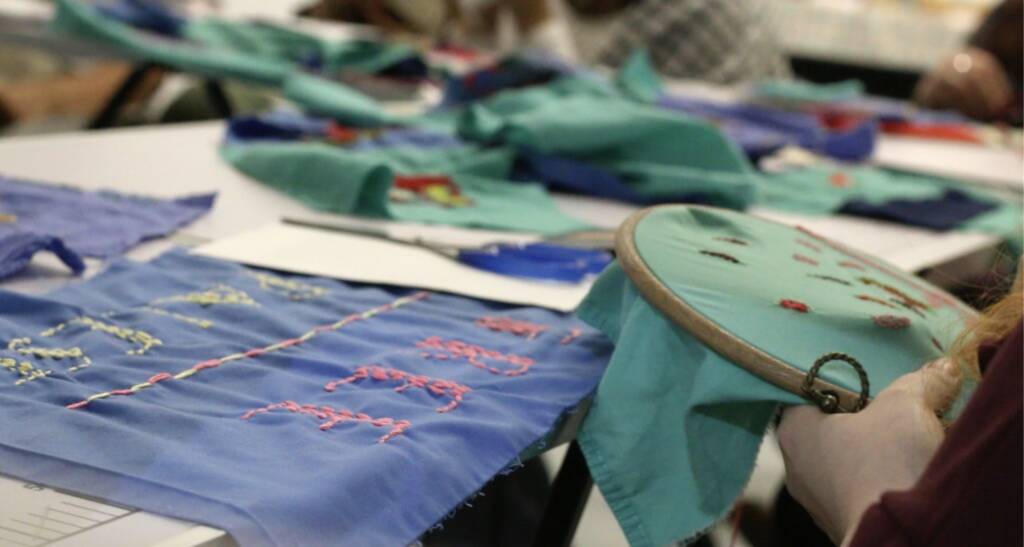
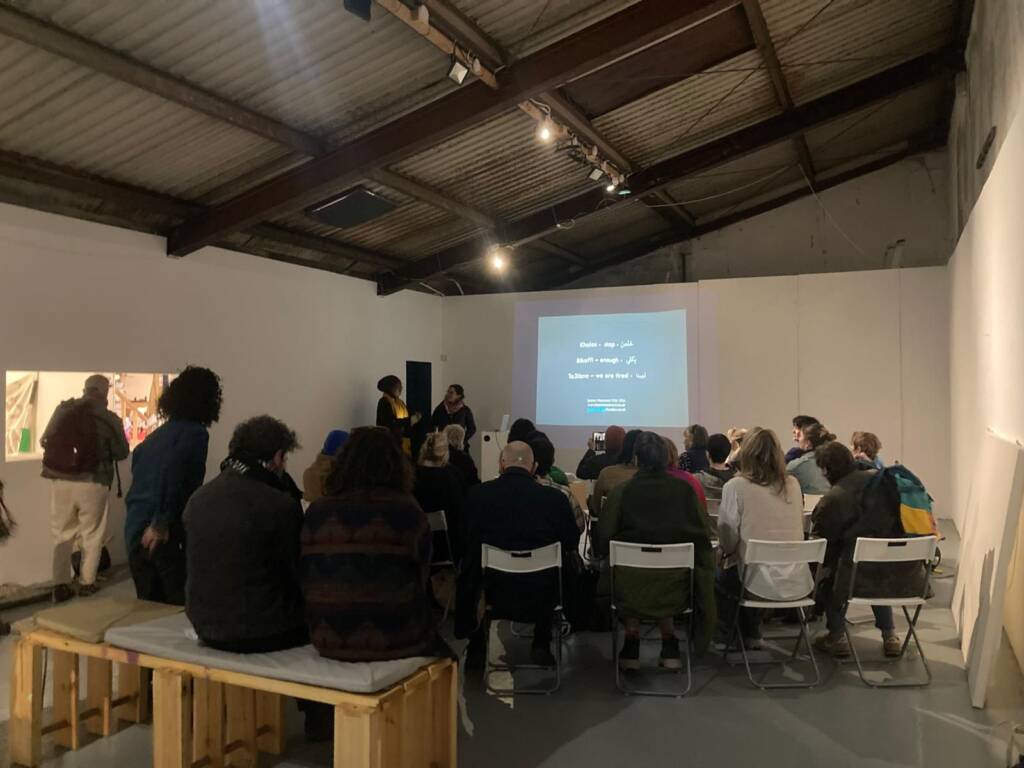
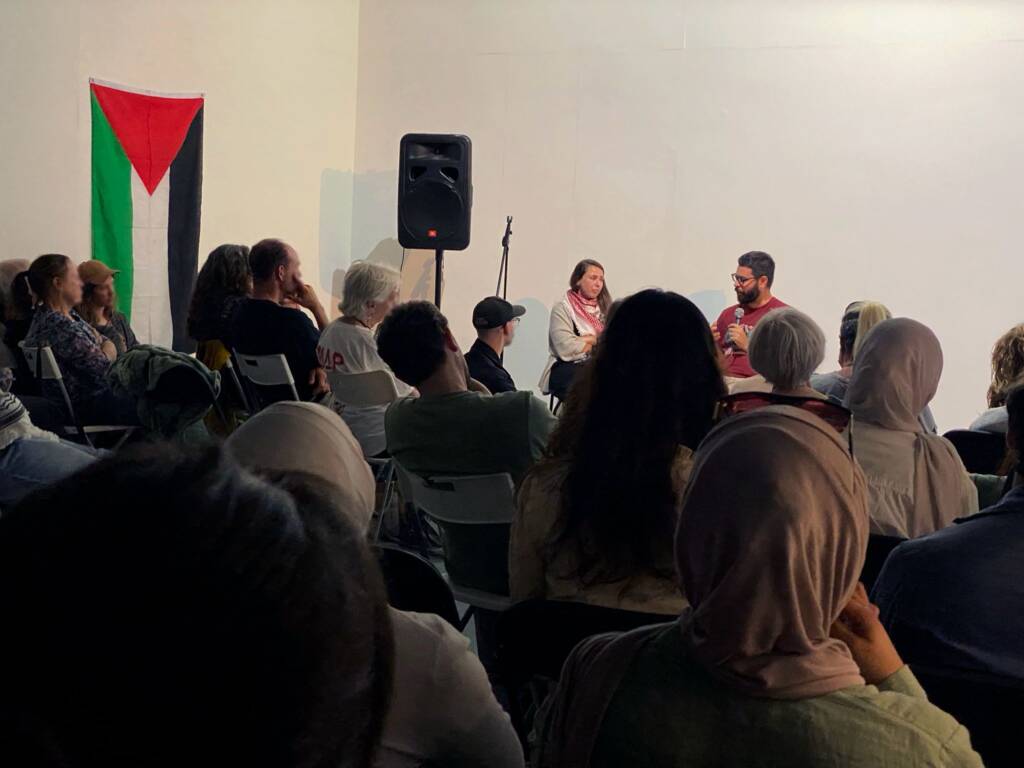
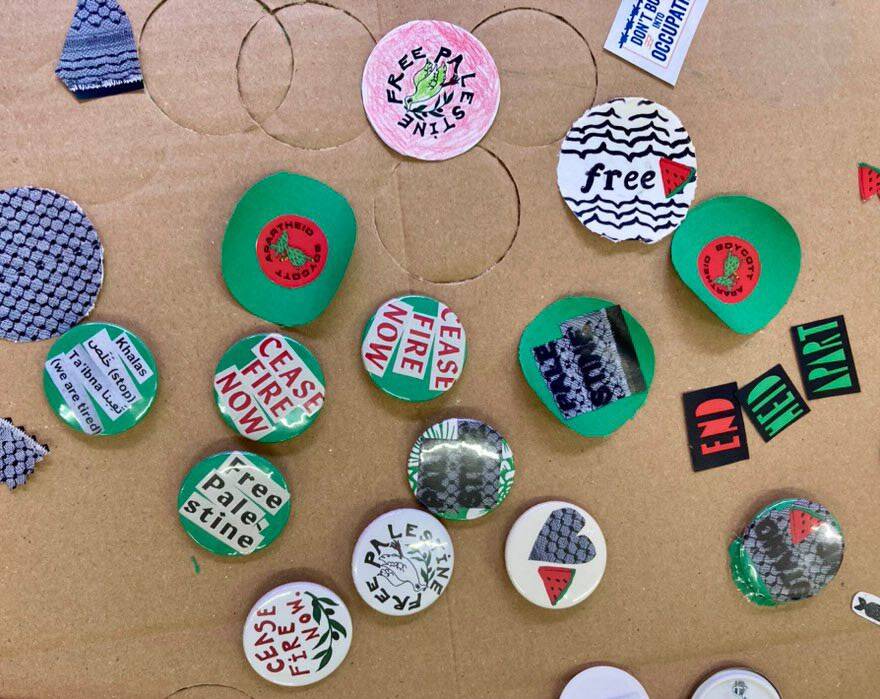
Community events held by Art Workers for Palestine Dundee
Artists and communities have a vital role to play in pushing for systemic change. By organising collectively, while also using our individual platforms, we can take tangible, effective actions to resist inequality and oppression. “We would encourage everyone to continue to show up in the spaces of solidarity,” says Art Workers for Palestine Dundee. “There are many ways to get involved in the struggle and in the movement to make change and to commit to the dismantling of colonial projects.”
We have seen many large organisations act defensively and with hostility, particularly in response to artists supporting liberation. Over the last year, artists have been harassed, de-platformed and attacked at the direction of institutions for exercising artistic expression and agency. Others have been silenced just because of their identity.
Many institutions have justified their behaviour under the claim that they must remain ‘objective’. But objectivity is a colonial standard, revered by institutions and the media yet impossible to apply in society, let alone the arts. This false pretence enables the authoritative voice, rooted in imperial knowledge and biases, to reinforce existing power structures. Being ‘objective’ never helps those who are oppressed, but this silence and apathy protects self-interest, in turn supporting the status quo.
In 1964, the release of the protest song ‘Mississippi Goddam’ pushed Nina Simone to leave the U.S. after the music industry orchestrated a boycott of her records. But this institutional suppression didn’t work — her song became an anthem of the American civil rights movement.
To disrupt systems of power, we must change how the arts sector operates: small close-knit networks of power held by institutions with no accountability to their audiences, staff, artists and partners.
Art Workers for Palestine Dundee urges institutions to adopt a healthier approach to feedback and criticism, and to open up to more meaningful opportunities for collective input. “We’d love to see organisations be more transparent,” they tell me. “Ego and organisational hierarchy [can be] eradicated — with a supportive and shared ethos prevailing into demonstrable action and activity.”
We must learn from the revolutionaries of the past and listen to those in the present if we are to build a more just future. In the words of Dundee musician and poet Mary Brooksbank, “I have never had any personal ambitions. I have but one: to make my contribution to destroy the capitalist system.”
Aileen Angsutorn Lees is a writer and multidisciplinary artist based in Perthshire. She is the founder of Decolonising The Outdoors, a creative and community project which dismantles narratives of dominating land and extracting nature.

If you would like to support us in creating even better content, please consider joining or supporting our Amps Community.